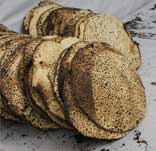Reflections
Pesach Sheni
The 14th of Iyar is celebrated as ‘Pesach Sheni’, a day when those who were ritually impure or in a distant land on Pesach itself had the opportunity to sacrifice the Korban Pesach (Pascal sacrifice)
On the 14th of Nissan, at the time when the Korban Pesach was being slaughtered, there were a number of people who were ritually impure and the seventh day of their countdown to purity fell on Erev Pesach. Since at the time the Korban was being sacrificed they were still considered impure, they were forbidden to join the festivities. There is a difference of opinion in Chazal as to what was the cause of their impurity – Rabbi Yosi haGlili reasons that these were the people who carried the coffin of Yosef haTzaddik, who had requested that his bones be brought up from Egypt and interred in the soil of Shechem. Rabbi Akiva disagrees and explains that these people were the Levi’im Mishael and Elitzafan who were the ones to handle the bodies of Aaron’s sons Nadav and Avihu, after they died when bringing a ‘strange fire’ before HaShem. A third opinion is that of Rabbi Yitzchak, who argues that from a chronological point of view these people could not have been the bearers of Yosef’s coffin, nor could they have been Mishael and Elitzafan since seven days had already passed from the time they had become impure until the 14th of Nissan – and therefore they were able to become pure and partake of the Korban Pesach like the rest of the nation. Rabbi Yitzchak concludes that these select few had been busy with the burial of a Mes Mitzva (unidentified corpse) close to Pesach, and as such were in an impure state unable to bring the Korban Pesach.
Those people who were unable to join in the sacrifice came to Moshe Rabbenu with a complaint: why should their lot be less than that of the rest of the nation, in that they had to lose out on this unique Mitzva? They claimed that although they themselves couldn’t bring the Korban because of their impurity, the Kohanim could sacrifice it on their behalf and they would eat it in purity after nightfall, by which time they would have retained their former pure status.
Moshe listened to what they had to say, and told them to wait until he had the opportunity to inquire of HaShem as to how they could resolve this dilemma.
Indeed, when HaShem revealed Himself to Moshe, He instructed him to relay the message that those who were impure on Pesach or were in a distant land and couldn’t offer the Korban at the appointed time would be able to bring it on the 14th of Iyar – a month later. This day was called by Chazal ‘Pesach Sheni’, and the law of eating the Korban together with unleavened bread and bitter herbs was to apply on Pesach Sheini too.
The laws of Pesach Sheini differ in many ways from Pesach itself, most obviously in the fact that on Pesach the Korban may not be accompanied by any Chametz (bread from dough that has risen), and in fact only after the people had removed all traces of Chametz were they then permitted to proceed with the Korban Pesach; whereas on Pesach Sheini there is no obligation to destroy one’s Chametz and the Korban may be eaten together with Chametz and Matza (unleavened bread) simultaneously. Another difference is that on Pesach the people would recite the whole of Hallel whilst offering up the Korban, whereas on Pesach Sheini Hallel is not said. Additionally, on Pesach itself the Korban Pesach was offered up together with the Korban Chagiga, whilst on Pesach Sheni there is no Korban Chagiga.
Despite the fact that Pesach Sheini is not celebrated as a Yom Tov and mundane work may be done, it is still considered a day of joy – and even nowadays, when due to our many sins we have not yet merited the rebuilding of the Beis HaMikdash, we don’t say Tachanun. There are those who have the custom to eat Matza on this day, so as to remember the Mitzva of eating the Korban Pesach together with Matza and Marror (bitter herbs).
For many years Pesach Sheini was a day when people would travel to visit the grave of Rabbi Shimon Bar Yochai in Meiron. This custom is mentioned in many ancient holy books from hundreds of years ago, the latest source being the ‘Calendar of Graves of Tzaddikim in Eretz Yisrael’ written seven hundred years ago by Rabbi Moshe Bassoula, wherein he describes his pilgrimage to Meiron along with over one thousand other people. In later years the Kabbalists of Tzefas changed the date of this annual pilgrimage to the 18th of Iyar – Lag B’Omer (33rd day of the Omer), as is the custom until today.






